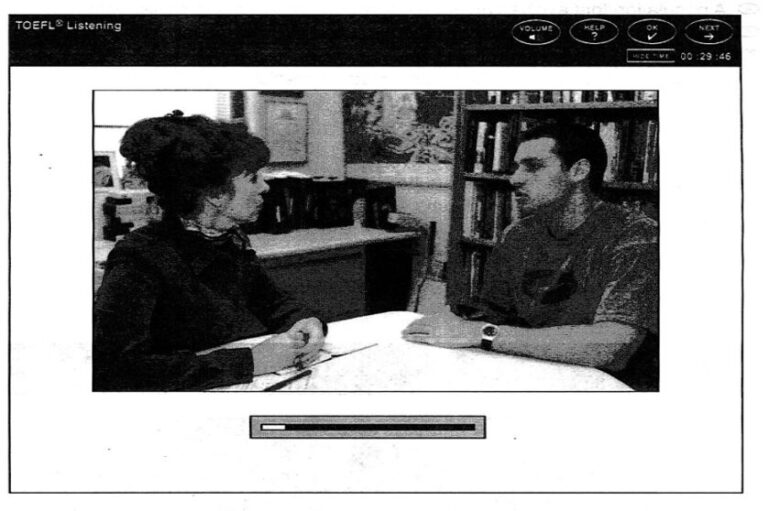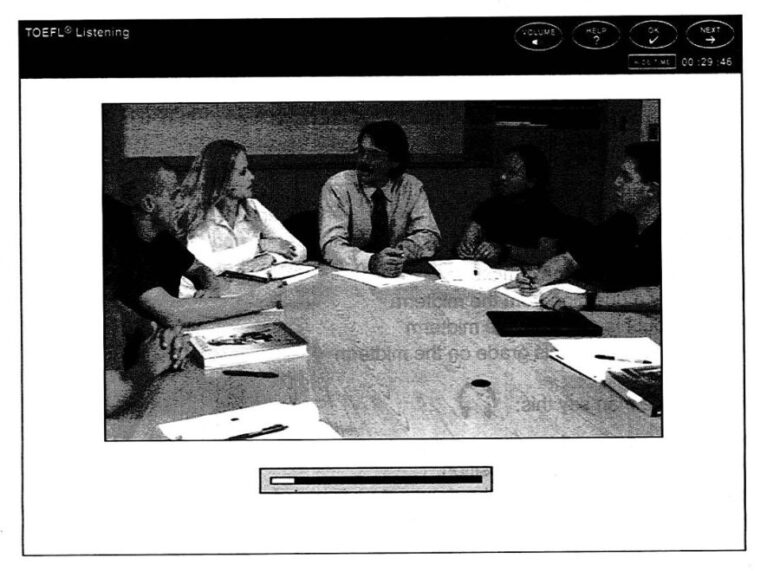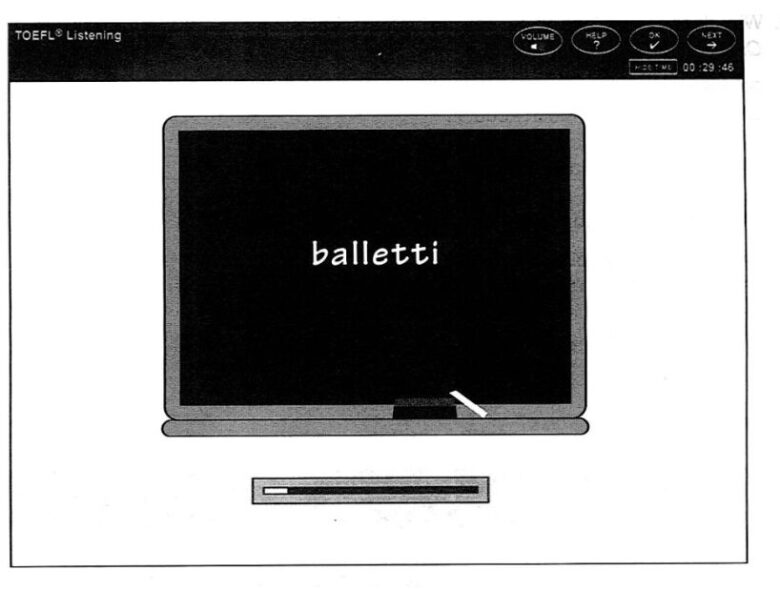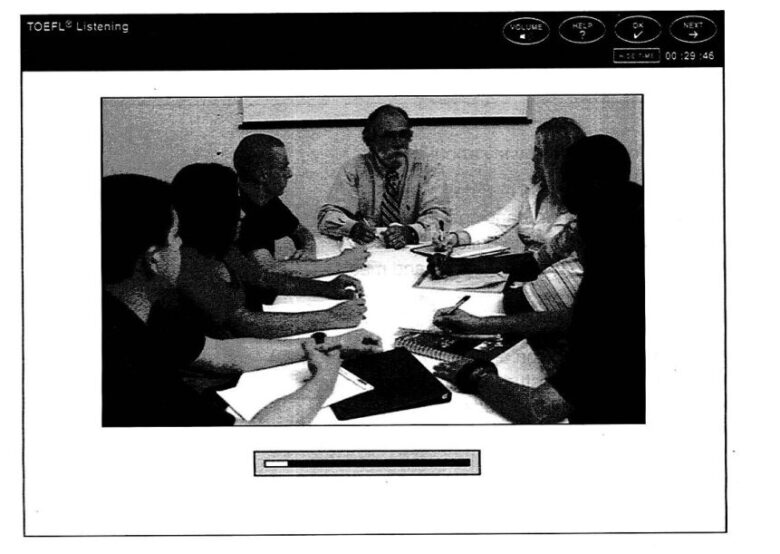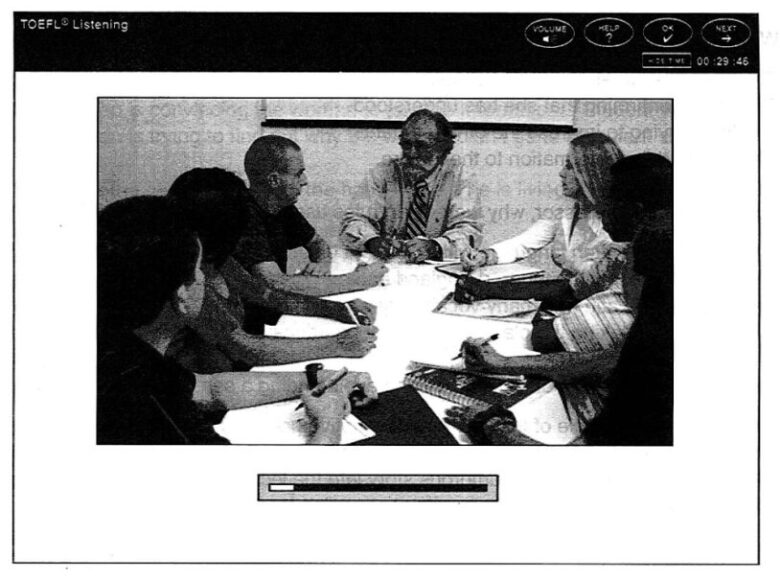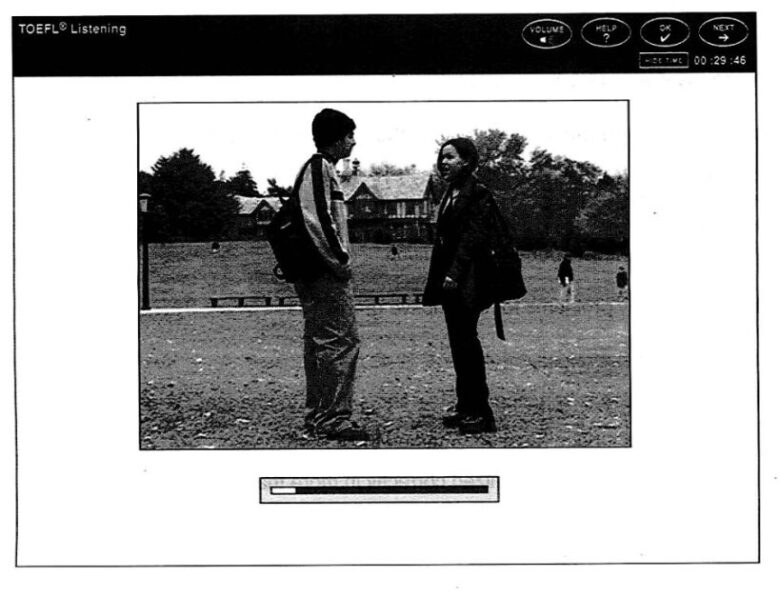TOEFL iBT Listening Practice Test 02 From Barron’s TOEFL iBT 13th Edition
The Listening section tests your ability to understand spoken English that is typical of interactions and academic speech on college campuses. During the test, you will listen to conversations and lectures and answer questions about them. There are two conversations and four lectures on the short format and three conversations and six lectures on the long format.
[soundcloud url=”https://api.soundcloud.com/tracks/277332783″ params=”color=ff5500&auto_play=false&hide_related=false&show_comments=true&show_user=true&show_reposts=false” width=”100%” height=”166″ iframe=”true” /]
Listening 1 “Professor’s Office”
1. Why does the man go to see his professor?
CD To prepare for the next midterm
CD To clarify a question from the midterm
CD To find out his grade on the midterm
CD To complain about his grade on the midterm
2. Why does the man say this:
CD He is giving something to the professor.
CD He is trying to justify his position.
CD He is apologizing because he does not understand.
CD He is signaling that he will explain his problem.
3. What did the man do wrong?
CD He did not finish the test within the time limit.
CD He did not study enough before the test.
CD He did not answer one question completely.
CD He did not understand a major concept.
4. According to the student, what is divergent evolution?
CD A population that evolves differently does not have a common ancestor.
CD A similar environment can affect the evolution of different species.
CD A similar group that is separated may develop different characteristics.
CD The climate of an area will allow scientists to predict the life forms.
5. What will Jerry probably do on the next test?
A. He will look for questions with several parts.
B. He will read the entire test before he begins.
C. He will ask for more time to finish.
D. He will write an outline for each essay.
Listening 2 “Art History Class’
6. What is the discussion mainly about?
CD Catherine de Medici’s entertainments
CD The figures for court dancing
CD The development of the ballet
CD The relationship between dance and meals
7. Why does the professor say this:
CD To end his explanation and begin the lecture
CD To apologize to the students about their tests
CD To comment about the students’ grades
CD To regain the attention of the class
8. According to the professor, what does the term balletti mean?
CD A dramatic story
CD A parade of horses
CD A dance done in figures
CD An outdoor entertainment
9. How did the early choreographers accommodate the abilities of amateur performers?
CD The steps were quite simple.
CD The same performance was repeated.
CD Practice sessions were lengthy.
CD The dance was seen from a distance.
10. Why does the professor mention that he checked several references about the length of Queen Louise’s Ballet?
CD He was very interested in the ballet.
CD He did not know much about it.
CD He wasn’t sure that it was accurate.
CD He wanted to impress the class.
11. What can be inferred about the professor?
CD He is not very polite to his class.
CD He encourages the students to participate.
CD He is not very interested in the topic.
CD He is probably a good dancer.
Listening 3 “Linguistics Class”
12. What is the discussion mainly about?
CD The history of the English language
CD Different types of grammar
CD A linguistic perspective for Latin
CD Standard language in schools
13. How does the professor make his point about native intuition?
CD He explains how to perform an easy experiment.
CD He tells the class about his personal experience.
CD He provides several examples of sentences.
CD He contrasts it with non-native intuition.
14. What are two key problems for descriptive grammar?
Click on 2 answer choices.
A. The information is very complicated and subject to change.
B. The formal language must be enforced in all situations.
C. The language can be organized correctly in more than one way.
D. The description takes time because linguists must agree.
15. Why does the student say this:
CD She is disagreeing with the professor.
CD She is confirming that she has understood.
CD She is trying to impress the other students.
CD She is adding information to the lecture.
16. According to the professor, why were Latin rules used for English grammar?
CD Latin was a written language with rules that did not change.
CD The Romans had conquered England and enforced using Latin.
CD English and Latin had many vocabulary words in common.
CD English was taking the place of Latin among educated Europeans.
17. Why does the professor discuss the rule to avoid ending a sentence with a preposition?
CD It is a good example of the way that descriptive grammar is used.
CD It shows the students how to use formal grammar in their speech.
CD It is a way to introduce a humorous story into the lecture.
CD It demonstrates the problem in using Latin rules for English.
Listening 4 “College Campus”
18. What is the purpose of this conversation?
CD The woman is encouraging the man to be more serious about his studies.
CD The woman is looking for alternatives to living in dormitory housing.
CD The man is convincing the woman to join the International Student Association
CD The man is trying to find out why the woman didn’t go to the talent show.
19. What does the man imply about the house where he is living?
CD He prefers the house to the dorm.
CD He is living at the house to save money.
CD He does not like doing chores at the house.
CD He thinks that the house is very crowded.
20. How does the man feel about the International Student Association?
CD He is sorry that only women can join the club.
CD He enjoys meeting people with different backgrounds.
CD He wishes that they would have more activities.
CD He will probably join the organization.
21. What does the woman mean when she says this:
CD She is trying to persuade the man.
CD She is not sure that she understood.
CD She is expressing doubt about the time
CD She is changing her mind about going.
22. What does the woman agree to do?
CD Join the club
CD Eat at a restaurant
CD Go to a meeting –
CD Study with the man


